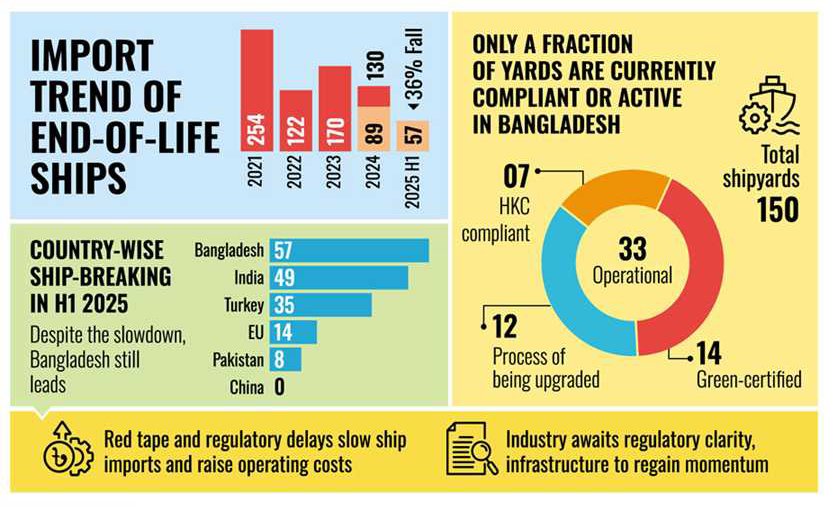
Published :
Updated :

Bangladesh's ship-breaking industry is facing significant headwinds, with imports of scrapped vessels plunging by 36 per cent in the first half of 2025.
The setback is largely due to new regulatory requirements, delayed clearances, and procedural complications under a stricter global compliance framework.
The country imported a total of 57 end-of-life ships during the January-June period this year, down from 89 ships in the same period of 2024, according to data released Monday by the NGO Shipbreaking Platform (NSP), a global coalition advocating for safer and greener dismantling practices
It noted that the downturn comes as Bangladesh transitions into compliance with the Hong Kong Convention (HKC), which officially took effect on June 26, 2025.
Annual data also reflects a broader slowdown. Bangladesh dismantled 130 vessels in 2024, compared to 170 in 2023, 122 in 2022, and 254 in 2021. The number stood at 144 in 2020, 236 in 2019, and 185 in 2018.
Globally, India brought in 49 scrapped ships in the first half of 2025, Turkey 35, the European Union 14, and Pakistan eight. China, which had been a major ship-recycling destination, dismantled none during this period.
Industry insiders blame the sharp drop on the absence of DASR (Document of Authorization to Conduct Ship Recycling), which is now mandatory under the HKC regime.
The government has yet to finalise the necessary criteria for issuing DASR, making it impossible for local yards to import vessels legally.
"We're unable to bring in ships because no yard has been issued the required DASR yet," said Kamal Uddin Ahmed, adviser to the Bangladesh Ship Breakers and Recyclers Association (BSBRA).
"Without it, no import is permitted under the Hong Kong Convention that Bangladesh has ratified."
Ahmed added that ship-breakers are now facing multiple bureaucratic hurdles, including prolonged delays in obtaining environmental clearance and other approvals.
"No Objection Certificates (NoC) have not been issued since March. The industry's reclassification from 'orange' to 'red' has only increased paperwork and waiting times."
He claimed that it now takes an additional one and a half to two months to get the necessary permissions to dismantle a ship after it's beached. "These complications are financially hurting yard owners and discouraging new investment in the sector," he said.
Despite the current slump, Ahmed noted progress in environmental compliance, stating that 14 ship-breaking yards have achieved "green yard" status, and about a dozen more are in the process of upgrading. "Safety and compliance have significantly improved over the years," he asserted.
Responding to the situation, ASM Shafiul Alam, director general of the Ship Recycling Board under the Ministry of Industries, said that the board recently received final approval from the ministry and expects to complete regulatory groundwork "within a week."
Sources confirmed that the Ship Recycling Board, formed under the Ship Recycling Act 2018, had remained largely non-functional due to bureaucratic delays.
It is now becoming operational with the mandate to provide one-stop services for over two dozen permits and licences, including import clearance and ship-cutting permission.
According to NSP, seven Bangladeshi yards have so far obtained Statements of Compliance (SoC) with the Hong Kong Convention.
However, the establishment of a TSDF (Treatment, Storage and Disposal Facility)-a key environmental safeguard-is still pending. The absence of such a facility, the platform warns, continues to contribute to pollution in coastal areas.
The NGO urged the Ship Recycling Board not to focus solely on easing business processes but also to prioritise environmental and worker safety, given the industry's long history of environmental harm and
human rights concerns.
Ship-breaking remains a vital component of Bangladesh's economy, supplying raw materials to the country's steel and light-engineering sectors.
Although there are about 150 shipyards in the country, only 25 to 30 are currently operational, according to industry insiders.
Munni_fe@yahoo.com


 For all latest news, follow The Financial Express Google News channel.
For all latest news, follow The Financial Express Google News channel.